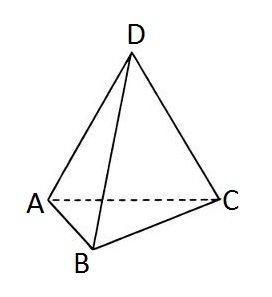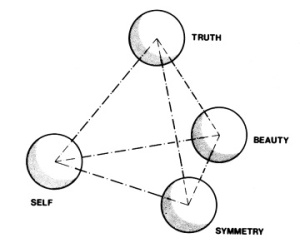‘Those who intend on becoming great should love neither themselves nor their own things, but only what is just, whether it happens to be done by themselves or others.’ – Plato
First of all I must thank Dan Blum of Respect Network http://security-architect.blogspot.com & Katryna Dow of Meeco http://katrynadow.me for suggesting the original premise for this piece. Basically, what if Plato, the founding Father of Western Philosophy, was kicking around today.
Plato was undoubtedly a giant in the wisdom stakes and like Lao Tzu before him it is so easy to be in awe of such a compelling character as he appeared to understand everything that was important about life before anyone else got out of bed. He even knew he had the sciences trumped before most of them had even emerged.
‘Wisdom alone is the science of other sciences.’ – Plato
So what if Plato had a second coming and presented today as an untypical, typical 21st Century Gen Y hipster with a burning desire to blog his paradigm shifting philosophy without fear of being shutdown.
Well, in this era he would be far more likely to emerge as the Founder and CEO of an Onexus Republic rather than form his Academy amidst a grove of olive trees outside the city walls.
As an aside on the brand Onexus http://www.onexus.com In the late 1990’s I had a flash of inspiration when describing what I thought the first wave of dot-coms could do in terms of disruption. For a start they could be one nexus, eliminating all middlemen and allowing the meeting of one with us. One day the two separate words of ‘One’ and ‘Nexus’ happened to combine in my minds eye as I spoke them out loud and Onexus or one multiplied by us was born.
I was so ecstatic that I now had my quintessential dot-com brand that I lay on the office floor making carpet angels and letting the euphoria wash over me. I’m a little more reserved these days but only a little as those that know me will testify.
Anyway, rolling forward over a decade and I have dusted off the brand again to embrace the Personal Sovereignty movement and MeCommerce in particular and I am also pleased to see that the rate of disruption is increasing as promised.
Disruption is nothing new, only these days because of technology it affects more of us much faster than ever before. This acceleration is no doubt due to the fact that our technology has reached a level where we have tools, mainly computational ones, to shape newer more complex ones, and so the half lives get halved again and again. All this innovation started somewhere and some 3000 years before Plato, the advent of the wheel no doubt disrupted those who carried things on their backs for a living.
So today Plato would be spoilt for choice to disseminate his ‘School of Thought’ through any number of technology delivery systems. Once his reputation was established he could even consider co-creating with a MOOC (Massive Open Online Course).
One of the fastest means however would be for him to simply register his own personal cloud name with a CSP like Onexus as part of the Respect Network http://www.respectnetwork.com the world’s first Personal Cloud Network. He could then blog to his hearts content building his thought leadership within a peer to peer sharing network of like minded souls without fear of intrusion by the ever present powers that be?
‘There must always remain something that is antagonistic to good.’ – Plato
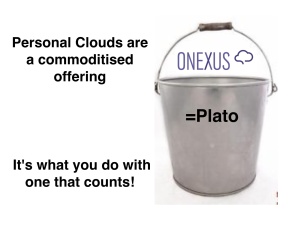
As you can see a Personal Cloud can be reduced to a bucket with your name on it. For added security you can always add a lid. That concludes the tech part of this blog, now back to the philosophy.
In reality of course a Onexus / Respect Network Personal Cloud is so much more than a bucket. It guarantees the option to be anonymous, the ability to sign-in, sign-on, communicate, exchange and be part of a decentralised peer-to-peer network where a Plato could continue to exchange his ideas freely and directly. Unlike current Social Networks he would not have to risk his ideas being indexed or data-mined or used for advertising or be removed totally from society so he was denied a voice.
The Personal Cloud itself is a commodity which can be carried around like a bucket. It’s most important feature as far as Plato would be concerned is that it is undeniably yours to decide what to carry and what to share. A Personal Sovereign Kingdom.
Like Plato I’m no great fan of democracy. The best you can say about it is that It will do for now and as modern polls show the rate of disenchantment within us the ‘Sheeple’ is growing worse by the year and yet again Plato was across this inherent trait of democracy as early as 400BC
‘One of the penalties for refusing to participate in politics is that you end up being governed by your inferiors.’ – Plato
A more recent thought leader: Churchill, also captured Democracy’s pros and cons nicely in two short quotes:
First he said that: ‘Democracy is the worst form of government, except for all those other forms that have been tried from time to time’ basically apart from all the others. Even Churchill may not have seen that our digital technology will allow us to explore forms of government that have not been imagined as yet, although he did concede that ‘the empires of the future are the empires of the mind.’
He also said in his usual cheeky fashion that ‘the best argument against democracy is a five-minute conversation with the average voter.’
Overall then, when it comes to democracy we don’t vote them in so much as we tend to vote them out. It’s not proactive or generative, it’s instinctive and reactive at best.
And so we let the self serving polarities rule us in turn, largely through our own default apathetic resignation. We are lucky if we get mediocrity for a term or two and a Plato ideal such as a Meritocracy ruled by Philosopher Kings and Queens is as illusive today as it was in his day.
‘Your silence gives consent.’ – Plato
Democracy does have certain advantages though, when it comes to keeping other less desirably forms of government in check. Plato saw this first hand himself when in his youth he witnessed the rise of the ‘Thirty Tyrants’. An oligarchy which by comparison made the previous democracy in Athens resemble a golden age.
And now coming up for three thousand years later our personal data is largely ruled by a small group of corporate oligarchs supposedly providing us services for free while they in turn are hacked by their own democratic government.
‘Good people do not need laws to tell them to act responsibly, while bad people will find a way around the laws.’ – Plato
Even Plato would acknowledge that this mess is still progress of sorts when you consider that the ‘Thirty Tyrants’ in his day, also eradicated five percent of Athenians during their short reign of terror.
My own most recent insight into the pros and cons of democracy came on a much anticipated visit to NASA’s Kennedy Space Center at Cape Canaveral this April.

The previous day my son Ross had checked off his holiday bucket list when we experienced the Harry Potter ride at Universal Studios after suffering over two hours in a queue. Now it was my turn as Kennedy was firmly on my boyhood bucket list when it had been the launch pad for the massive Mercury, Apollo and the Shuttle Programs.
There was also the added bonus that a launch scheduled for earlier in the week had been postponed to go ahead on the day of our visit!
Sadly the days of the big scale NASA programs are over and the one we witnessed that day, the Falcon 9, while still quite spectacular is financed by SpaceX, a private Company. The Falcon 9 Rocket is the brainchild of their Founder Elon Musk who made his first fortune in the dot-com days with PayPal before investing in the more tangible engineering fields of space rockets and Tesla electric cars.
Anyway, while I pondered this odd state of affairs and the shift from public to private Space activity, the Falcon fired it’s 9 Merlin Engines. Ross and I stood in the shadow of a Sycamore “Moon Tree.” The tree’s plaque described how the original seed had been to the Moon with the Apollo 14 Mission. It had now grown to maturity and as Ross watched the rocket journey out of site, I saw a relatively straight branch that had fallen at our feet which I quickly stripped down and fashioned into a wand.
Now to me this was real Magic! Not the manufactured magic of Hogwart’s from the day before when we had purchased the obligatory official merchandise including replica wands. Ross lit up too when I explained the significance. The DNA code in this new wand had been to the Moon and back. He was holding in his hand something material born from 4.5 billion years of geosphere evolving into biosphere, that had then journeyed to another world and back again. This one data point made a common or garden tree branch wand priceless as far as Ross was concerned. While an official Harry Potter resin wand made in China will only set you back $40 US including tax.

Apparently ‘Moon Trees’ have been planted in cities around the world. Just don’t tell my Son that the Cape Canaveral Sycamore is not the only one. I don’t want to dilute the magic.
‘Wonder is the feeling of the philosopher, and philosophy begins in wonder.’ – Plato
Now please stay with me because it struck me like never before how a single data point on a material object could change everything in terms of how we placed value on it. Even when the object was intrinsically exactly the same as before.
I also then remembered an article I had read a few years back about Neil Armstrong, the first man on the moon, a vital data point that had destined him to become the most famous Astronaut to ever launch from the Cape.
The article had described how Neil had become involved in an unusual legal battle with his barber of 20 years. After cutting Armstrong’s hair, the barber had sold some of it to a collector for $3,000 without Armstrong’s knowledge or permission. Neil threatened legal action unless the barber returned the hair or donated the proceeds to a charity of Neil’s choosing. The barber was unable to get the hair back, but decided to donate the proceeds to the charity of Neil’s choice anyway.
If you have read Neil Armstrong’s bio then apart from his amazing feats as an Astronaut and Test Pilot, you will know that he was an incredibly private and humble man and sadly he passed away a couple of years ago in 2012.
‘A hero is born among a hundred, a wise man is found among a thousand, but an accomplished one might not be found even among a hundred thousand men.’ – Plato
In this crazy and unjust world that over values exclusivity this would no doubt have made the stolen sample of his hair worth even more?
So this got me thinking; why is it that when something leaves your body such as hair which is not special other than the fact it contains our unique biological data in the form of DNA that it is held in so much higher regard than digital data which is also uniquely ours and in most cases these days will have a far greater impact on our lives when it leaves our control? Neil’s biological data was attributed extra value because of his historic achievements but this is not the case for the rest of us mere mortals.
In short, a meme is not worth a gene! Or at least this is the case for now?
I was still considering this bias in favour of value placed on our personal biological data versus the value we place on our personal digital data when I boarded the flight home. Our technology is no doubt moving so fast that our emotional connection has not caught up with the fact that discarded or stolen digital data is far more likely to come back and bite us than our misappropriated biological data?
One of the movies I chose to watch on the long flight was Rush, a film about the 70’s Formula 1 rivalry between James Hunt and Niki Lauda directed by Ron Howard who incidentally also directed Apollo 13. One scene stood out for me like no other. In it, Niki is crossing the pit lane to start the race which is about to nearly end his life when an autograph hunter stops him and he obliges, but when the fan troubles him further to put the date to his signature. Niki asks: “The date? Why?”
The fan responds: “You never know. Could be your last.”
Niki looks back in anger before walking away to his fate in the ensuing inferno.
If ever there was an example of Katryna Dow’s vital insight that one of the four key aspects with which to value personal data is it’s time bound nature. In this case the fan would have in his possession proof of Niki’s last ever signature which would no doubt make it more valuable than all the rest he would have given out in his career which lacked that one vital data point.
So now let us come back to how a modern day Plato might perceive things in our digital democratic era? For one he would witness that the same form of democracy that captured our hearts, minds and imagination with the NASA Apollo Moon Shot program, is now capturing our personal data with their NSA surveillance programs, like PRISM.
Both of these democratic government agencies required billions of dollars and tens of thousands of their citizens to achieve their ambitious aims. One filled us with inspirational awe and advanced our everyday technology in so many ways and while it may be argued that the other may still advance our surveillance technology? This will be unlikely to serve us the people, instead the whole sordid realisation just brings our contempt and quite rightfully so.
So what has changed in the 40 years from NASA’s glory days to the recent NSA revelations, apart from the coincidental dropping of a letter from a government agency acronym?
The short answer is nothing has changed in terms of a democratic government’s desire to spy on it’s own people. After all, we had the Watergate debacle in the same era as Apollo, it’s just that our governments now have the technical ability to sanction wholesale industrial scale eavesdropping on our lives these days and so they do.
‘He who steals a little steals with the same wish as he who steals much, but with less power.’ -Plato
So the original Plato and a modern day equivalent would see that not a lot has changed in terms of wielding power for the self serving objective of remaining in control of our shared resources.
And until the aspiration for power is used to serve some other notion, it will continue to shape our politics much in the same way as when the Greeks of Plato’s day used fire signals to communicate.
‘This and no other is the root from which a tyrant springs; when he first appears he is a protector.’ – Plato
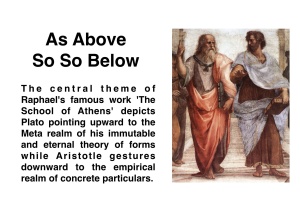
Equally, all of our technological advances throughout the intervening millennia would ensure that a modern day Plato would find it even more essential to gesture upward to the immutable and eternal forms of truth, symmetry and beauty to counter a contemporary Aristotle pointing down to an empirical understanding of big data.
‘If particulars are to have meaning, there must be Universals’ – Plato
Since the fundamental political landscape has not shifted it would be to the technological advances that a modern Plato would look to caution against excess. I for one have noticed that all the new technologies I have encountered in life very soon demonstrate that their greatest asset so often becomes the source of their greatest liability.
Instant messaging’s greatest asset is it’s ease of use and not surprisingly it’s greatest liability is it’s ease of use.

However on the asset side of technology’s ledger, a modern day Plato could instantly become his own Philosopher King. Albeit in a Kingdom of one on one with other Kingdoms of one.
‘There will be no end to the troubles of states, or of humanity itself, till philosophers become kings in this world, or till those we now call kings and rulers really and truly become philosophers, and political power and philosophy thus come into the same hands.’ – Plato
With the personal sovereignty of his own cloud in a peer to peer network our reincarnated Plato would soon see that there in would lay the critical liability. Quite simply, the ease of entry into this type of Kingdom makes opinions or personal philosophy, ubiquitous.
Again on the asset side of the ledger at least the powers that be could not shut down a personal cloud the way they eventually shutdown the original Academy founded by Plato in Ancient Greece. But then, back in the ancient day there were so few scholars that they kept most of the good stuff hence Plato’s work was passed down. Whereas these days, there are so many pundits and opinions and storage is so easy that we keep absolutely everything and so finding the great above all the noise and nonsense, is the real issue.
I have no doubt that there are countless genius bloggers out there. Plato’s idea of Philosopher Kings and Queens who won’t be recognised in their own lifetime, if at all. Hidden in ubiquity or ahead of their time, which will make them wrong in their own time, they will go unheeded.
So the truth is that Plato’s vision for the rise of Philosopher Kings and Queens is more realisable than ever. Unfortunately the same technology that has empowered a peer to peer world where the great influence of wisdom can be disseminated to help humanity find it’s way is also the reason it is for the most part being drowned out.
‘The measure of a man is what he does with power.’ – Plato
One way to counteract this of course is the notion of up-votes. Unfortunately, as Plato would very quickly point out, up-voting and ‘Likes’ is still a democratic process that may or may not take merit into account. As an example, the only social network that I am still on is Quora http://www.quora.com ‘Your Best Source of Knowledge’.
Quora is a community of Q&A fanatics who ask and answer, seeking and dispensing the sort of exclusive knowledge that a Google search will not satisfy. Others like myself often amuse ourselves with harmless trolls of unanswered questions.
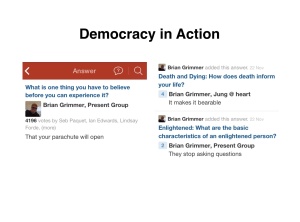
As you can see on the left, my flippant answer regarding the parachute got an enormous rate of up-votes because everyone gets it and finds that it hit the spot. While some other more deeply considered philosophical understandings on the right, go largely ignored.
As in Plato’s day, it appears good still remains the enemy of great! The Plato’s of today who are ahead of their time may well remain so? Only to unlock the secrets of today’s unsustainable state of affairs with enlightened solutions for the generations to come.
So this brings us full circle to Plato’s great Allegory of the Cave. And as Dan Blum pointed out in a recent blog, at the end of the allegory the freed one is returned there to dwell with the prisoners, sharing in their labors and honors.
Maybe enough of us who have been set free by this latest awareness around privacy can encourage the others to turn their heads and see for the first time the real objects that deny us privacy. Only when others come to grasp the true forms that Plato espoused will they see the real causes of their distracting shadows and they will realise their error.

